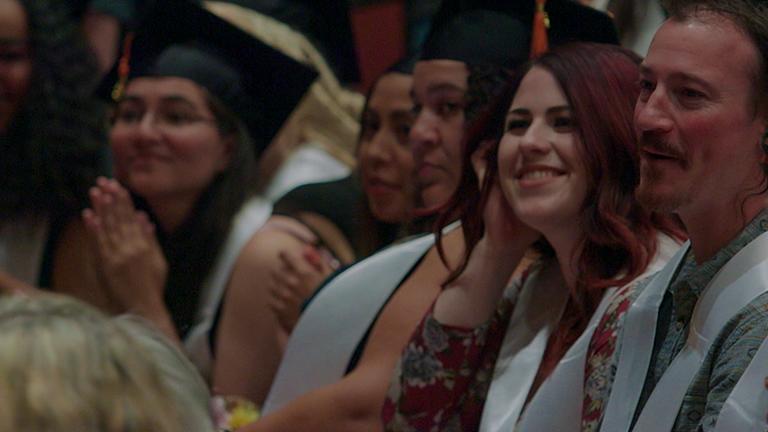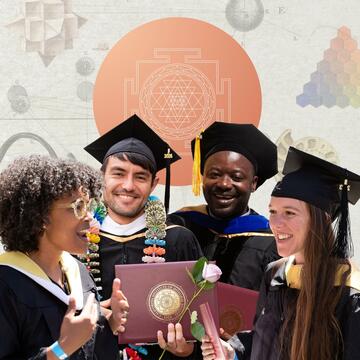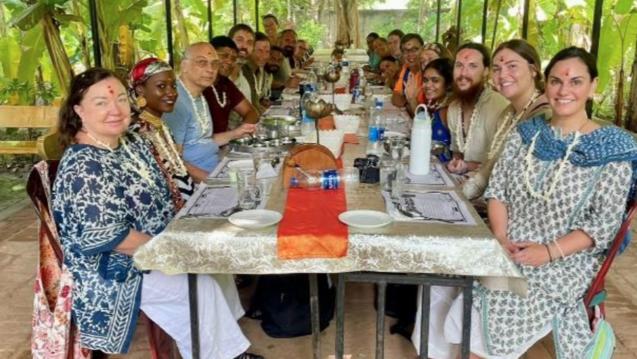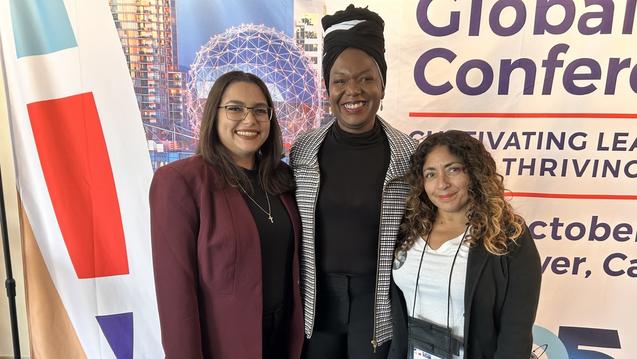Last fall, Human Sexuality doctoral students and faculty members presented two panels at the National Women's Studies Association (NWSA) meetings.

How the Bachelor's Completion Program Changed Our Family's Life
A student's mom writes about the unique and transformative degree.
My son Aidan has always been a reluctant student. He's bright but restless, and over the years, he has had trouble staying focused in traditional classrooms. There are always a million other things he'd rather be doing.
I had hoped college would be different and that he would find the work more engaging than he did in high school. He started college in Montana, where he received a generous scholarship, but after three years there, he was burned out. He liked a few of his courses, he said, but many rehashed material he'd learned in high school; others were large lecture classes that left him numb with boredom.
Aidan left Montana last summer, planning to go to the local state college.
At CIIS, where I'd recently started working as a communications consultant, I learned about the Bachelor of Arts in Interdisciplinary Studies program, where students who haven't completed college can earn a Bachelor of Arts in one year. I told Aidan about the program; he was intrigued by the hybrid format (a mix of in-person and online classes) and the integrated approach and immediately applied.
Aidan came home from his first weekend of B.A. in Interdisciplinary Studies classes exhausted but exhilarated--and hasn't looked back.
"CIIS has woken me up intellectually," he told me after his first semester. "I was just going through the motions before, trying to fulfill the requirements and get college over with. CIIS has pushed me to challenge myself and to get as much out of my education as I can."
Outstanding Graduation Rates
Most B.A. in Interdisciplinary Studies students feel the same way. The program's completion rate is one that most colleges would envy: 80 percent graduate within two years. By comparison, the six-year BA completion rate for students entering four-year colleges is just 59 percent, according to the National Center for Education Statistics.
Only 42 percent of undergraduate students at four-year colleges graduate in four years, according to U.S. News & World Report. The program's retention rate is particularly high when compared with other "nontraditional" programs (typically geared to older students), where retention rates hover at 50 percent.
What accounts for the B.A. in Interdisciplinary Studies program's high completion rate? Michelle Eng, Dean of Undergraduate Studies, credits two features of the program: "The first is the individual support students receive from our faculty and their academic advisors; our goal is to help students finish their degrees in a timely way," she said. "The second factor is the fantastic learning community of peers who support each other through the process and encourage one another to complete their degrees."
Why This Education Model Works
For one thing, the program's integral studies approach means that instead of disciplines being siloed in separate classes, they're woven together, so connections between different subjects are established. "Integral studies promotes cross-fertilization, synergy, and collaboration across disciplines," said Professor Alec MacLeod, who helped design the program in 1993 and has been part of the faculty ever since. "We're presenting information about the world and its complexity in a way that connects with students' experiences."
Integral studies mean that students aren't passive receptacles for disconnected chunks of information. I think this is why Aidan uses the word "relevant" so often when he talks about his classes, discussions, and readings. "We're always connecting what we're learning back to events that are going on today," he told me. "We're grappling with real issues. It isn't theoretical knowledge being spouted at you."
Back to the Future
B.A. in Interdisciplinary Studies faculty also keep the curriculum relevant by encouraging students to make connections with their own experiences. As Michelle Eng pointed out, "The program is learner-centered: Faculty go in with the understanding that they are there to support each student where they are. In most college classes, students aren't asked, ‘What is your passion? What is your burning question?' Our faculty ask the question and support that inquiry. It becomes part of every student's focus throughout each semester and in their senior project."
Denise Boston, who is CIIS' Dean of the Office of Diversity and Inclusion and also teaches in the program, called the B.A. in Interdisciplinary Studies experience "life-changing." She pointed to the curriculum, which focuses on the individual during the first semester; is concerned with community and culture in the second; and ends with a global perspective. "the program is beautifully structured," said Boston. "They make it very relevant to the student's lives and experiences."
The B.A. in Interdisciplinary Studies program also meets students where they are by accepting and valuing a broad range of learning styles. "Often, students who seek out a degree completion program have been wounded in some way by the education system," MacLeod pointed out. "They've been told they are not smart enough, or they've had other negative messages. Part of the CIIS mission and commitment is to the idea that there are multiple ways of learning." The faculty present information in different formats and students are allowed to fulfill assignments by doing a performance or making a visual presentation, for example.
"Many of our students have had a hard time in other educational settings," Eng said. "They've been told they can't write, or their accent is too strong, or they're too scattered. So restoring that confidence and helping them discover their specific strengths and learning style is really important."
Emphasis on Learning Community
The program's structure-an intensive weekend of classes every three weeks, supplemented by homework that includes readings, online forums, and assignments-allows students with families and full-time jobs to participate. Even though the students don't meet daily, and a lot of the work happens online, there is a strong emphasis on community. Students and faculty form a tight bond during classes and discussions in which everyone is encouraged to participate.
"You really get to know the students in your cohort, and they are all different ages and from different walks of life," said Mahesh Francis, admissions counselor for the School of Undergraduate Studies, and an alum of the program. "You get a lot of peer review and meet with the teachers often. The program is supportive in and outside the classroom."
Boston cited the team-teaching approach (each cohort has two professors who share teaching throughout the semester) and the community it fosters as another strength of the program. "These are fabulous professors who share their own lives and work very closely with their students," she said. "It creates an environment that is truly something to be cherished. Every student walks in alone, but they don't walk out alone."
Academic Rigor and Expanding Comfort Zones
The B.A. in Interdisciplinary Studies may be student-driven and supportive-but that doesn't make it easy. Students do intensive reading and writing, with an emphasis on independent, critical thinking. Francis, who is now pursuing a master's degree in community mental health, said that the program boosted his academic skills. "It helped improve my public speaking, my ability to work with people and my writing and presentation skills. I am doing really well in my master's program as a result."
MacLeod commented on what type of student wouldn't do well in the program. "A student who wants to be told what to do," he said. "A student who doesn't tolerate ambiguity and sees the world in black and white wouldn't do well, either. We don't provide answers. We want our students to leave here better able to ask good questions."
The B.A. in Interdisciplinary Studies requires students to participate in a way that those accustomed to the anonymity of a university lecture hall may find uncomfortable at first. Classes and small group discussions are animated, and everyone is urged to participate. "There is nowhere to hide," Aidan told me. "You have to communicate and stay present. If you aren't engaged, there is no reason to be here. I used to believe a passive education sounded great, but I like this a lot better even if it is really challenging. I knew the program would push me out of my comfort zone, and it has." The program has also rekindled Aidan's creativity: He's been drawing and writing poems, which he hasn't done in several years."
Related Academic Program
Related News
Sasha Bainer, an East-West Psychology student, provides us with insights into their firsthand experience of Auroville.
Graduate students in CIIS’ Transformative Leadership Master's Program Capture Prestigious ILA Student Case Competition



